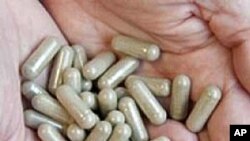Scientists investigating a popular herbal treatment for enlarged prostate, saw palmetto, have concluded it is no more effective than a placebo.
That conclusion comes from a study which included hundreds of men in their forties and older.
As men age, the prostate gland often gets larger. The prostate surrounds the urethra, which carries urine from the bladder to the penis. An enlarged prostate can impede the flow of urine, causing a variety of symptoms.
There are prescription drugs which can ease symptoms, but many men prefer the "natural" alternative: an extract from the saw palmetto tree, native to the American Southeast.
"It's actually a very complex extract. It has quite a number of different chemicals and molecules within it, several of which are plausible agents to affect the way a man urinates, to even shrink the prostate," says Gerald L. Andreiole of Washington University Medical School in St. Louis, who co-authored a paper on the study.
The men in the study were randomly assigned to two groups - one got progressively larger doses of saw palmetto; the other group got a placebo - a dummy pill. It was a double-blind study - neither the participants nor staff knew who was getting which.
They filled out a standard questionnaire used by urologists to assess prostate enlargement. It includes questions like, "How many times did you need to get up [to urinate] at night, how often did you experience frequency, urgency, the sense of incomplete bladder emptying. This is a standard symptom score that has been used for close to 20 years."
By the end of the study, after about 16 months, Andriole says the symptom scores improved for both groups of men. "But there was no difference in the magnitude of symptom score improvement between placebo and saw palmetto."
And increasing the dose of saw palmetto didn't make any difference. Some critics found fault with a previous study that found no benefit from saw palmetto, saying the dosages were too low.
Saw palmetto is safe and, thanks to the so-called "placebo effect," it does improve symptoms, but Andriole says it doesn't address more serious prostate conditions "such as urinary tract infections, complete inability to urinate, or even the need to have surgery. The drugs we have significantly reduce a man's chance of ever experiencing those, in addition to improving his symptoms," Andriole says.
Since saw palmetto does not require a prescription, he notes that patients who use the herbal supplements might not see a doctor. That raises the risk that much more serious problems, like the early stages of prostate cancer, might go undiagnosed.











